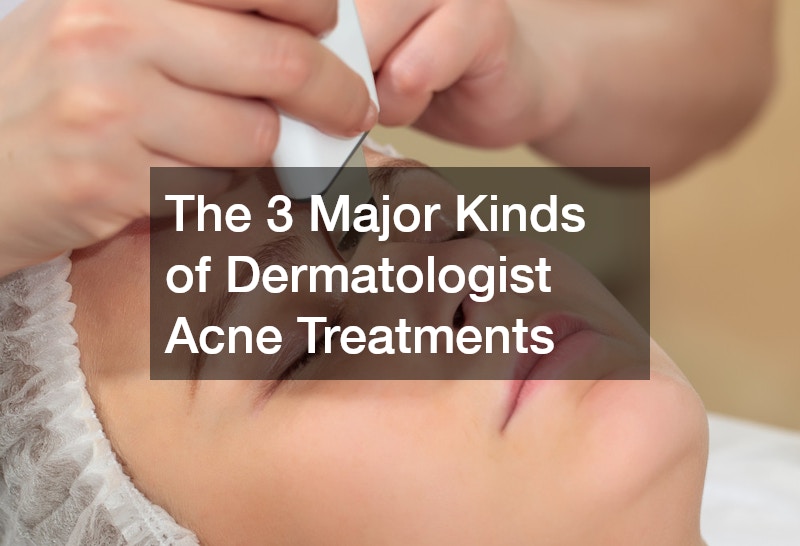
The 3 Major Kinds of Dermatologist Acne Treatments

Finding the right acne treatment can make a significant difference in achieving clear, healthy skin. Whether you’re dealing with breakouts, clogged pores, or persistent blemishes, choosing the right products for your skin type is essential.
For those struggling with fungal acne, selecting the best face wash for fungal acne is key. Look for products with antifungal ingredients like ketoconazole or pyrithione zinc, and avoid heavy oils that can worsen the condition. Gentle cleansers help maintain skin balance without irritating it.

If you have delicate skin, using acne kits for sensitive skin can provide a well-rounded approach to treatment. These kits often include mild cleansers, soothing moisturizers, and targeted treatments designed to reduce inflammation without stripping the skin.
When it comes to treating acne, benzoyl peroxide and salicylic acid products are two of the most effective options. Salicylic acid works by exfoliating inside the pores, reducing oil buildup, and preventing breakouts, while benzoyl peroxide kills acne-causing bacteria and helps reduce inflammation.
For targeted treatment, a benzoyl peroxide acne spot treatment can rapidly reduce the size and redness of pimples. Applying a small amount directly to blemishes can help speed up healing and prevent new breakouts. By choosing the right acne treatment for your specific skin concerns, you can create an effective routine that promotes clearer, healthier skin.
Acne can occur in any part of the body, especially on the face, chest, and back. In most cases, acne is itchy and can cause enormous discomfort. Acne is classified as either mild or severe. Mild acne is easily treatable over the counter. It is less itchy and has fewer pimples. Patients with severe acne must visit a dermatologists office for further examination and treatment. Severe acne may result from medical reasons such as depression and hormonal changes.
It is, therefore, important to determine the cause of acne before treating it. The presence of acne on the cheeks causes reduced self-esteem and damage to the surrounding cells on the skin in case they burst. Acne on the back and chest may result in uncomfortable itching, making it impossible to concentrate. Spicy foods, dehydration, and greasy foods are some of the major causes of bad acne around the mouth and chin. Your dermatologist will offer the best prescription spot treatment for acne. It’s advisable to consult specialists, whether treating minor or severe acne because they will always offer the best type of acne treatment. In addition, when dealing with mild acne that may come from spicy food and dehydration, you can use home remedies such as steaming, aloe Vera, and dilute lemon.

More than 50 million Americans suffer from acne. It affects people of all ages, not just teenagers. Acne typically starts at puberty and affects close to half of all teenagers at one point. However, acne can affect people well into their adulthood. Men and women in their 20s, 30s, 40s, and even 50s can get it. Regardless of when it comes, nearly 85% of all people get acne at least once during their lifetimes.
Because acne is so common, much effort and research has been put into acne treatments. Dermatologist acne treatments have been proven to be highly effective against acne growth, and there are a number of treatments available off the counter and with a prescription. There are also more specialized treatments that are given by dermatologist or other skin treatment professionals. To give you a better idea of what these treatments are, here are three general categories of acne treatments:
Topical Treatments: The majority of acne medications are applied directly to the skin. These creams and ointments do everything from killing acne-causing bacteria to reducing your skin’s oil levels and they typically contain a retinoid, benzoyl peroxide, antibiotic, or salicylic acid. Topical treatments can be purchased in regular stores or, for more specialized treatments, from a dermatologist.
Body Treatments: More severe cases of acne are sometimes treated with pills or injections that take effect throughout your body, not just the skin. Acne cysts and nodules usually require this treatment, which include antibiotics, birth control pills (for women), and Isotretinoin.
Dermatologist Procedures: Dermatologists offer office procedures for some patients. Laser therapy, for example, is used to reduce bacteria on the skin. Chemical peels are used to treat blackheads and papules. “Drainage and extraction” procedures are used to remove large acne cysts when medication doesn’t work.
For more information about dermatologist acne treatments, feel free to leave a comment or question at the bottom.